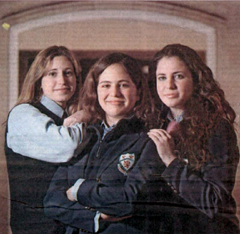

by Karen Kelly
In the beginning, the three daughters of Middle Eastern diplomats did not get along. When Jordanian Lana Ayoub met Israeli Michelle Divon in the halls of Ashbury College, the two exchanged cool glances and walked away without saying a word.
Then Iranian Tara Ogaick clashed with Ms. Divon during an English class discussion about the terrorist attacks of Sept. 11, 2001. The pair left the classroom with a healthy dislike of each other.
"It becomes an instinct, this separation between us," says Ms. Divon.
Ms. Ayoub agrees. "People make that first judgment right there, just because someone's Israeli or Arab."
After weeks spent avoiding each other, the three Grade 11 students talked again.
"We just realized that if we can't get along ..." begins Ms. Ogaick.
"... how can there ever be peace?" says Ms. Divon in reply.
After a long discussion, the young women reached three conclusions:
- They would never fully agree on the history and causes of the conflict.
- All three were deeply pained by the violence occurring in their part of the world.
- And if there was any hope for peace, it had to start right now, between them.
"We hoped that if the three of us could manage to talk together and work together, others could do it, too," said Ms. Divon.
They became friends and began speaking out -- first to their classmates at Ashbury and then to student groups at other high schools and universities. (They speak tomorrow morning at Elmwood School in Rockcliffe.)
Their presentation draws heavily on personal experience.
Ms. Ayoub, 17, a Christian and the daughter of Jordanian Ambassador Fouad Ayoub, tells the story of her cousin, a Palestinian living in the West Bank with whom she has frequent contact.
She talks about the hardship of life under Israeli occupation and describes how her cousin ran from a firing Israeli tank as she walked home from school after curfew.
Michelle Divon, a 17-year-old Jew and the daughter of Israeli Ambassador Haim Divon, shares vivid memories of life in Jerusalem in which she rode the bus and walked the streets with the knowledge that, at any time, she might be a target. She also reads an e-mail from an Israeli friend whose father and uncle were killed by a suicide bomber. The letter is significant because the girl remains committed to peace, despite her family's tragedy.
As an Iranian-born Muslim, Tara Ogaick, 16, focuses on the hatred between people of different religions and her experience with religious extremism in Saudi Arabia, where she lived for five years. While there, she became increasingly worried as she watched hatred and stereotypes become even more entrenched, eventually prompting her to come to Canada to finish her education.
"There's so much death. If you ask anyone in either place, they have all suffered a loss," says Ms. Ogaick, whose parents work in the diplomatic community. "We need a new generation of thinking to put all of this pain in perspective. Because the old generation has failed."
In addition to sparking a dialogue between Jews, Muslims and Arabs in Canada, the young women are also challenging the assumptions of Canadians who aren't personally affected by the conflict.
"People don't understand that CNN isn't always right," says Ms. Ayoub, a statement which her friends vigorously support. "Television doesn't show the whole picture of what's happening there. People need to educate themselves before they start passing judgment."
Ms. Ayoub and her friends have a year and a half to accomplish their mission. In that time, they hope to host discussion groups, circulate a petition for peace and raise money for Seeds for Peace, a camp in Maine with programs for Israeli, Palestinian and other Arab children.
After that, they'll go their separate ways -- Ms. Ogaick to Saudi Arabia, Ms. Ayoub to Jordan and Ms. Divon to Israel for her compulsory service in the Israeli military. They intend to keep in touch and continue to promote peace and dialogue between their countries. They say their work is motivated not only by altruism but by necessity.
"It is hard for us, because we are on different sides of the conflict," acknowledges Ms. Divon, as Ms. Ayoub nods in agreement. "But there's nothing to lose. This is the life we're going back to. We have to work towards something better."
Michelle, Lana, and Tara receive e-mail at United_Mideast@hotmail.com .
Re: Diplomats' daughters reach their own peace accord, Feb. 19.
It's inspiring to see these teenagers taking a stand for peace in the Israeli-Palestinian conflict. To be able to unite for this goal, abandoning resentment and accepting their differences, requires a certain level of maturity many adults never achieve.
A disturbing number of youths don't keep up-to-date with the news, and do not understand the extent of the violence occurring in other parts of the world. We can hope that the spreading of knowledge by people of our age will help strengthen awareness and concern among youth.
As a former student of Ashbury College, I am proud to know that such outstanding citizens now grace the halls through which I once walked. I applaud these girls for their efforts thus far, and wish them luck as they continue their quest for peace.
Nicola Young, 17
Ottawa